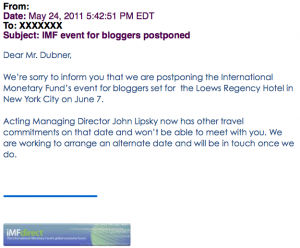A Stack of Bills Reaching to the Moon: How to Quantify Our National Debt
Now that the U.S. national debt is in the headlines, the media is awash in astronomical numbers such as $14.3 trillion (the current debt). Everyone realizes that this number is incomprehensible. Even back in 1981, when the national debt was only about $1 trillion, the debt was still incomprehensible. Thus, speechwriters for Ronald Reagan created, or at least popularized, a widely used attempt to give it meaning. Speaking to Congress in February 1981, Reagan said:
A few weeks ago I called such a figure, a trillion dollars, incomprehensible, and I’ve been trying ever since to think of a way to illustrate how big a trillion really is. And the best I could come up with is that if you had a stack of thousand-dollar bills in your hand only 4 inches high, you’d be a millionaire. A trillion dollars would be a stack of thousand-dollar bills 67 miles high.
This comparison is often quoted as a stack of one-dollar bills 67,000 miles high (perhaps because thousand-dollar bills don’t exist). No matter which denomination you use, I give the explanation an A for effort, but an F for performance. For I have little idea of how far 67,000 miles is. I know it’s way too far to walk and even too far to fly (jumbo jets have a maximum range of around 7,000 miles). But is it large as a national debt? I have no idea. Perhaps a large national debt would reach all the way to Mars. The connection to a height has merely replaced one meaningless idea ($1 trillion) with another meaningless idea (a stack 67,000 miles high).

